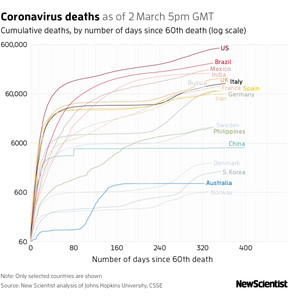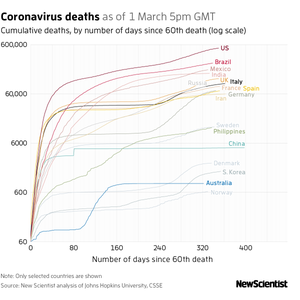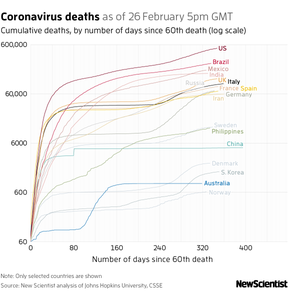[ad_1]

Susan Walls of Martinsburg receives her boost dose at a coronavirus disease (COVID-19) community vaccination event.
REUTERS/Kevin Lamarque
Latest coronavirus news as of 5pm on 3 March
US to have enough covid-19 vaccines for all adults by end of May
US president Joe Biden announced the US is on track to have enough covid-19 vaccine doses to vaccinate its entire adult population by the end of May. “Great news, but stay vigilant,” said Biden. “It’s not over yet,” he added. More than 76 million people in the US have received a first dose of covid-19 vaccine so far – equivalent to about 23 per cent of the population. Not all adults will be vaccinated by the end of May, as the vaccines will take time to administer, but the country is on track to meet Biden’s target of delivering 100 million doses in his first 100 days in office.
Advertisement
The governor of Texas, Greg Abbott, announced that the state will lift its requirement for people to wear face coverings and will allow businesses to reopen at full capacity next week. This is in contrast to advice from the US Centers for Disease Control and Prevention, which on 1 March warned of a potential fourth surge of cases before the majority of people in the country are vaccinated.
Other coronavirus news
A preliminary study led by researchers at the University of Bristol, UK, indicates that a single dose of the Pfizer/BioNTech or Oxford/AstraZeneca vaccine reduces the risk of hospitalisation with covid-19 by about 80 per cent among people aged 80 and over. The results add to earlier findings from an analysis by Public Health England, which found that a single dose of either vaccine is 80 per cent effective at preventing hospitalisation among people over 80. “This adds to growing evidence showing that the vaccines are working to reduce infections and save lives,” Mary Ramsay, Public Health England’s head of immunisation, told the BMJ.
Austria will receive an additional 100,000 doses of the Pfizer/BioNTech covid-19 vaccine to administer to all adults in the Schwaz district of the Tyrol province, where there are currently 66 active cases of people infected with the B.1351 coronavirus variant first identified in South Africa.
UK chancellor of the exchequer Rishi Sunak announced an additional £1.65 billion to support the UK’s covid-19 vaccine rollout in the latest budget.
Coronavirus deaths
The worldwide covid-19 death toll has passed 2.55 million. The number of confirmed cases is more than 114.8 million, according to Johns Hopkins University, though the true number of cases will be much higher.
Latest on coronavirus from New Scientist
Fighting Ebola alongside covid-19: Guinea has vaccinated over 1000 people in the two weeks since its latest Ebola outbreak was declared, including close contacts of those infected.
Essential information about coronavirus
Everything you need to know about the pandemic
Where did coronavirus come from? And other covid-19 questions answered
You could be spreading the coronavirus without realising you’ve got it
Which covid-19 treatments work and how close are we to getting more?
What will it take to get a covid-19 vaccine to the world?
What to read, watch and listen to about coronavirus
The New York Times is tracking hospital bed occupancy in England in an interactive graphic.
Panorama: The Race for a Vaccine is a BBC documentary about the inside story of the development of the Oxford/AstraZeneca vaccine against covid-19.
Race Against the Virus: Hunt for a Vaccine is a Channel 4 documentary which tells the story of the coronavirus pandemic through the eyes of the scientists on the frontline.
The New York Times is assessing the progress of different vaccine candidates and potential drug treatments for covid-19, and ranking them for effectiveness and safety.
Humans of COVID-19 is a project highlighting the experiences of key workers on the frontline in the fight against coronavirus in the UK, through social media.
Belly Mujinga: Searching for the Truth is a BBC Panorama investigation of the death of transport worker Belly Mujinga from covid-19, following reports she had been coughed and spat on by a customer at London’s Victoria Station.
Coronavirus, Explained on Netflix is a short documentary series examining the on-going coronavirus pandemic, the efforts to fight it and ways to manage its mental health toll.
New Scientist Weekly features updates and analysis on the latest developments in the covid-19 pandemic. Our podcast sees expert journalists from the magazine discuss the biggest science stories to hit the headlines each week – from technology and space, to health and the environment.
COVID-19: The Pandemic that Never Should Have Happened, and How to Stop the Next One by Debora Mackenzie is about how the pandemic happened and why it will happen again if we don’t do things differently in future.
The Rules of Contagion is about the new science of contagion and the surprising ways it shapes our lives and behaviour. The author, Adam Kucharski, is an epidemiologist at the London School of Hygiene and Tropical Medicine, UK, and in the book he examines how diseases spread and why they stop.

An elderly patient receiving the COVID-19 vaccination
Andrew Aitchison / In Pictures v
2 March
Deaths from covid-19 in England and Wales are falling quickest among people over 80
Covid-19 deaths in England and Wales are falling fastest among people aged 80 and over, figures from the Office for National Statistics (ONS) suggest, indicating that the vaccination programme has had an impact on deaths from the disease. People aged 80 and over were included in the top four priority groups for covid-19 vaccination. According to analysis of ONS data by the Guardian, 1622 people aged 80 and above were reported to have died from covid-19 in the week up to 19 February, down from 5300 four weeks earlier and equivalent to a reduction of 69 per cent. Among people aged between 70 and 79, there was a reduction in covid-19 deaths of 65 per cent over the same period, and the equivalent figure was 55 per cent for people aged 0 to 69.
“Together with the evidence for reduction of hospitalisations after both the Pfizer/BioNTech and the Oxford/AstraZeneca vaccines, the message is clear: vaccines work for those 80+ and 70+ and they are saving lives,” said Zania Stamataki at the University of Birmingham in a statement.
More than 20.2 million people in the UK as a whole had received a first dose of covid-19 vaccine as of 1 March.
Other coronavirus news
The search for a person who tested positive for the P.1 variant of coronavirus in England has been narrowed down to 379 households in the south-east of the country, UK health minister Matt Hancock told parliament on 2 March. Six cases of the P.1 coronavirus variant, first detected in people travelling from Brazil to Japan, have been identified in the UK. “We’re grateful that a number of potential cases have come forward,” said Hancock.
Germany is expected to start easing some coronavirus restrictions from 8 March. Under new draft rules, a maximum of five people from two households would be allowed to meet. Currently, meetings are restricted to a maximum of two people. Some shops and salons would also be allowed to reopen. The draft plans for easing measures will be discussed by national and state government leaders on 3 March.
A World Health Organization (WHO) panel is advising against the use of the malaria drug hydroxychloroquine to treat covid-19 patients. In a statement, the panel said hydroxychloroquine is “no longer a research priority” and that “resources should be used to evaluate other more promising drugs to prevent covid-19”.
The WHO has said it is “unrealistic” to expect the coronavirus pandemic will be over by the end of 2021. “I think it will be very premature, and I think unrealistic, to think that we’re going to finish with this virus by the end of the year,” Michael Ryan, executive director of the WHO’s Health Emergencies Program, told a press conference on 1 March.
Coronavirus deaths

The worldwide covid-19 death toll has passed 2.54 million. The number of confirmed cases is more than 114.5 million, according to Johns Hopkins University, though the true number of cases will be much higher.

BRISTOL, ENGLAND – MARCH 1: A worker takes a coronavirus test through the window of a car.
Matthew Horwood/Getty Images
1 March
Health officials in England attempt to trace person infected with P.1 virus variant
Efforts are underway in England to trace a person infected with the P.1 coronavirus variant, after they used a home testing kit but didn’t complete a registration form. The P.1 variant was first identified in people who were travelling from Brazil to Japan on 10 January, and the infected person is one of six cases of the P.1 variant detected in the UK in February. Three of the six cases were detected in England and the remaining three in Scotland. Public health officials are appealing for anyone who hasn’t yet received a result from a test on 12 or 13 February to come forward by calling 119. Since 15 February, travellers arriving in England from 33 countries – including Brazil – have been required to quarantine in a hotel for 10 days. In Scotland, the hotel quarantine rule applies to all international arrivals.
UK prime minister Boris Johnson said the government has no intention to reverse its plans to ease coronavirus restrictions in England. “Our whole strategy is to go forward in a way that is cautious but irreversible. And we don’t think that there’s any reason on this basis to change that now,” he told journalists on 1 March. Under the government’s current plans, schools in England are expected to reopen on 8 March. To support this planned reopening of schools, the government has said that families with children in school will be able to test themselves for coronavirus twice a week from home, free of charge.
Across the UK, more than 20 million people have received a first dose of a covid-19 vaccine.
Other coronavirus news
The first covid-19 vaccinations through the World Health Organization’s COVAX scheme were administered in Ghana and Ivory Coast on 1 March. “This is a day many of us have been dreaming of,” said WHO director-general Tedros Adhanom Ghebreyesus in a statement. “I am sure that through COVAX and international solidarity we will be able to reach the most at-risk everywhere. Global equitable access to life-saving vaccines is the surest way to save lives and rebuild economies,” he said. Ghana and Côte d’Ivoire received 600,000 and 504,000 doses respectively of the Oxford/AstraZeneca vaccine licensed and manufactured by the Serum Institute of India.
The European Commission plans to present a proposal on creating an EU-wide digital covid-19 passport, which could allow EU citizens to travel more freely within the bloc during the summer. The “digital green pass” would provide proof that a person has been vaccinated against covid-19 or coronavirus test results for those who haven’t been vaccinated. “The aim is to gradually enable them to move safely in the European Union or abroad – for work or tourism,” said European Commission president Ursula von der Leyen.
The US Food and Drug Administration has authorised Johnson & Johnson’s single-shot covid-19 vaccine for emergency use. The first doses of the vaccine will be transported to US states on 1 March.
Coronavirus deaths

The worldwide covid-19 death toll has passed 2.53 million. The number of confirmed cases is more than 114.2 million, according to Johns Hopkins University, though the true number of cases will be much higher.

A healthcare professional draws up a dose of Pfizer/BioNTech Covid-19 vaccine.
OLI SCARFF/AFP via Getty Images
26 February
One dose of Pfizer vaccine shows 75 per cent reduction in asymptomatic infections
There is yet more good news on vaccine effectiveness. A study based on nearly 9000 coronavirus tests done on healthcare workers in Cambridge, UK, has found that asymptomatic infections fell by 75 per cent 12 days after they got one dose of the Pfizer/BioNTech vaccine. There was a similar reduction in symptomatic infections.
The finding is significant because it shows the vaccine will greatly reduce the spread of the virus. It was already clear from clinical trials and previous studies that the Pfizer vaccine is highly effective at preventing symptomatic infections but we did not know how many vaccinated people might still get infected without symptoms and potentially pass the disease on to others.
“This will mean a substantial reduction in transmission of the virus as more and more people are vaccinated, which is really great news,” study leader Mike Weekes at the University of Cambridge, told the Guardian.
Other coronavirus news
Fifty million Covid-19 vaccine doses have been given to people in the US since President Joe Biden took office 37 days ago, taking the total to around 67 million. Biden had promised to deliver 100 million doses in his first 100 days, so his administration is on course to comfortably beat this target. But he warned that things will not return to normal soon. “This is not a victory lap. Everything is not fixed. We have a long way to go. And that day when everything is back to normal depends on all of us,” Biden said.
New Zealand has reported one more locally acquired case of coronavirus. The infected person went to work at a fast food restaurant on Monday despite being told to isolate at home. But officials say the small cluster of cases in Auckland is under control, and have not imposed another lockdown on the city. “This is a situation where we know the source of the cases [and] we know where there may have been contact with others,” said Prime Minister Jacinda Ardern.
Coronavirus deaths

The worldwide covid-19 death toll has passed 2.5 million. The number of confirmed cases is more than 113 million, according to Johns Hopkins University, though the true number of cases will be much higher.
See previous updates from February 2021, January 2021, November/December 2020, and March to November 2020.
More on these topics:
[ad_2]
Source link




